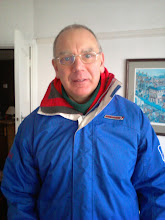The second island on our cruise itinerary was Dominica. We docked at the capital, Roseau.
Dominica;
officially the Commonwealth of Dominica, is an island nation in the Lesser
Antilles region of the Caribbean Sea, south-southeast of Guadeloupe and
northwest of Martinique.
It is 290 square miles and the
highest point is Morne Diablotins, (4,747 ft). The Commonwealth of Dominica had a population of
71,293 at the 2011 Census.
Dominica
has been nicknamed the "Nature Isle of the Caribbean" - it features
lush mountainous rainforests, and is the home of many rare plant, animal, and bird species.
Christopher
Columbus named the island after the day of the week on which he spotted it, a
Sunday (dominica in Latin), 3 November 1493. In the hundred years after
Columbus's landing, Dominica remained isolated, and even more Caribs settled
there after being driven from surrounding islands as European powers entered
the region. France formally ceded possession of Dominica to Great Britain in
1763. Great Britain then established a small colony on the island in 1805.
The
emancipation of African slaves occurred throughout the British Empire in 1834,
and, in 1838, Dominica became the first British Caribbean colony to have a
legislature controlled by an African majority. In 1896, the United Kingdom
reassumed governmental control of Dominica, turning it into a Crown colony.
Half a century later, from 1958 to 1962, Dominica became a province of the
short-lived West Indies Federation. On 3 November 1978, Dominica became an
independent nation.
We went on a tour of the island - David was our tour guide
We visited the Botanical Gardens covering some 40 acres.
The planning of these Gardens began in 1890 on land where sugar cane was grown. Very soon the gardens, which were divided into an ornamental section and an economic section, became a "must visit" place
This School Bus was a casualty of Hurricane David in 1979 - it had recently arrived from Canada and was destroyed before it came into use
The Trafalgar Falls
Bubbling sulphur springs - the smell of "bad egg" gas (Hydrogen Sulphide to the chemists among you)
Tropical rainforests
Typical Caribbean weather - sun and some short heavy showers - means splendid rainbows
For more photos of our time on Dominica click Dominica
Subscribe to:
Post Comments (Atom)














No comments:
Post a Comment